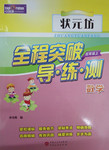题目内容
【题目】--Mark, I failed in the exam again, I’m so upset.
--Don’t worry, I think the first thing ______ is ______ your weak points.
A. to do, find out B. being done, to find out
C. to do, to hold out D. being done, hold out
【答案】A
【解析】
考查不定式用法。句意:—Mark,我又一次没有考及格,我很难过。—别担心,我认为要做的第一件事情就是找到你的薄弱环节。当被修饰的名词前面有序数词修饰,或被修饰的词就是序数词的时候,可以使用不定式做定语,所以第一空里使用to do;当主语中已经有了do的某种形式时,做表语的不定式符号to可以省略,所以第二空里使用find out。故A项正确。

练习册系列答案
 状元坊全程突破导练测系列答案
状元坊全程突破导练测系列答案
相关题目